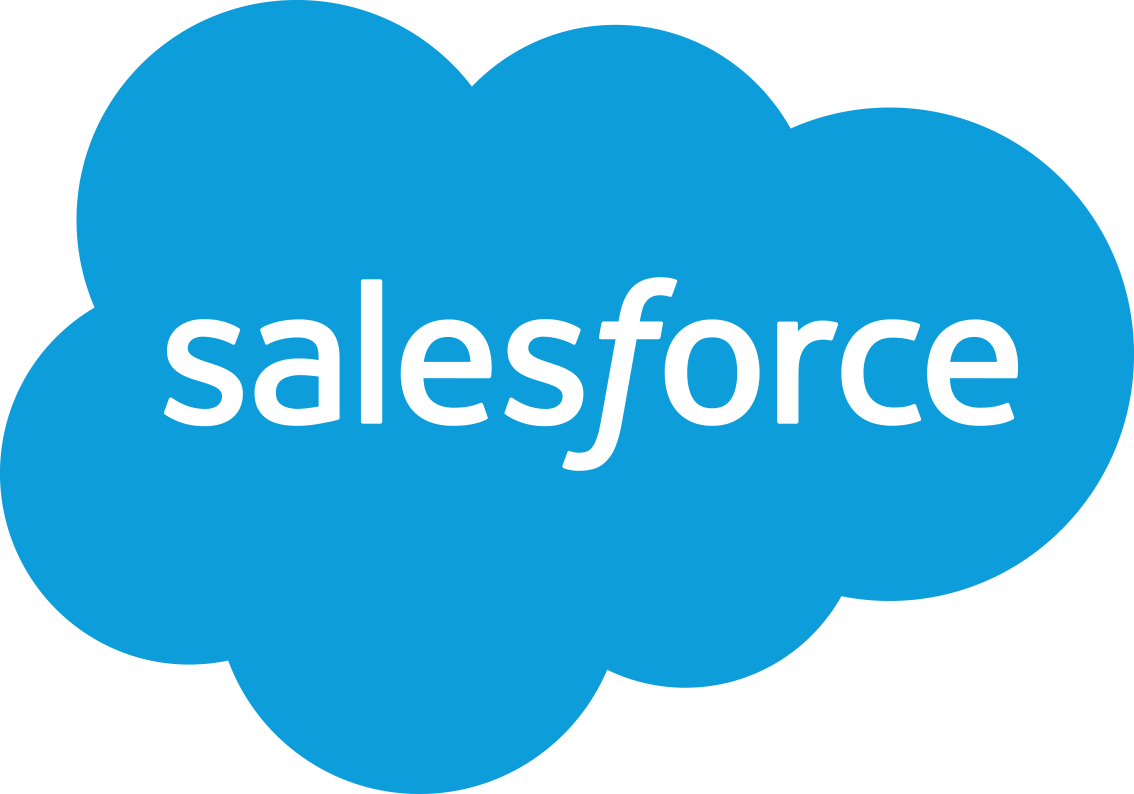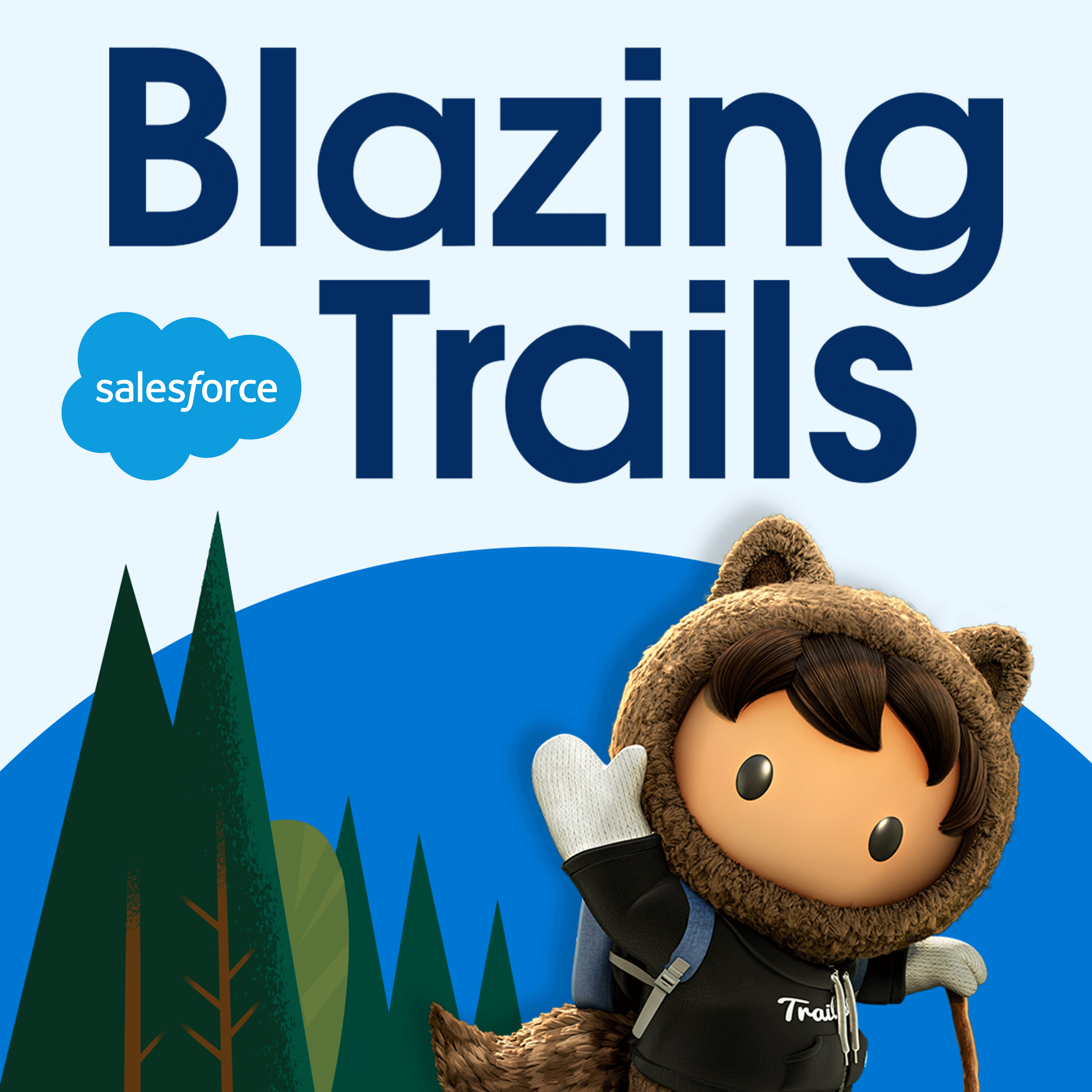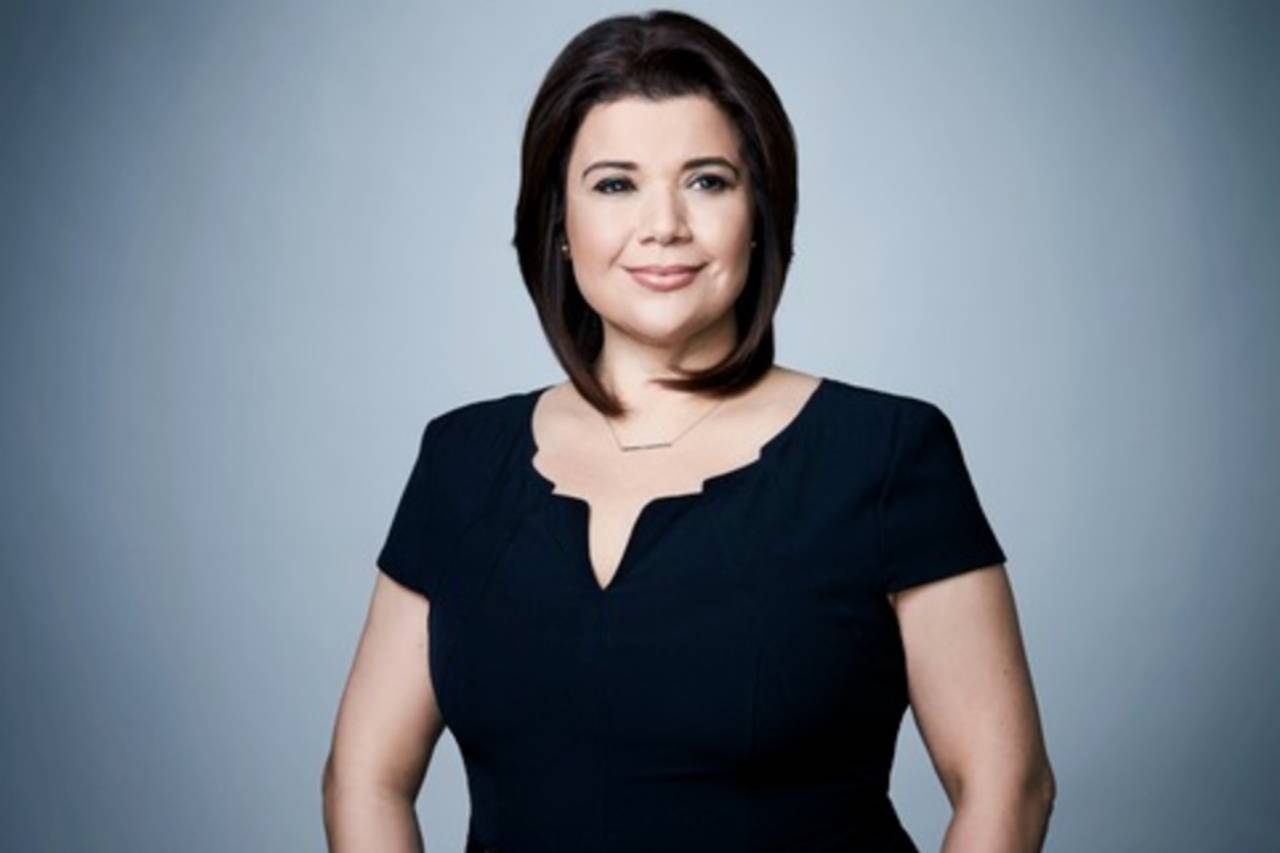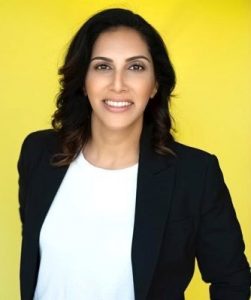How Companies Can Help End the Global Cycle of COVID-19: A Conversation with Ana Navarro and Dr. Geeta Nayyer
- 0.5
- 1
- 1.25
- 1.5
- 1.75
- 2
Michael Rivo: Welcome back to Blazing Trails. I'm Michael Rivo from Salesforce Studios. Today, I'm joined by my podcast partner. Rachel Levin. Welcome back to the show, Rachel.
Rachel Levin: Oh, do you mean my show, Michael?
Michael Rivo: Well, yes. Today, Rachel has a fantastic interview that we're going to hear. Rachel, can you tell us about it?
Rachel Levin: Well, Michael, I thought this moment would never come and I know our listeners are going to be really excited to hear me finally doing an interview. I got to sit down with Ana Navarro, who is a CNN commentator, regular guest on The View and Republican strategist. She joined Dr. Geeta Nayyar, who is the chief medical officer for Salesforce. So we discussed the vaccine rollout and how that's going in India and Latin America and all the ongoing challenges there. We also talked about what people here in the U. S. should be thinking about as more and more places continue to open up. Michael, here in the Bay Area, the numbers of infection are so low and we finally have opened up the whole state of California, so it's easy to feel like, Hey, this is over," but as Dr G. really points out, if we don't continue to all do our part, that's not going to be the case for the rest of the world, especially as people start traveling and traveling internationally. So I think it was a very positive conversation, but it also was sobering and saying," Okay, we can't let our guard down. Enjoy this moment right now, but let's all do our part."
Michael Rivo: Okay, great. Well, let's get into your conversation, Rachel, with Ana Navarro, CNN commentator and Republican political strategist, and Dr. Geeta Nayyar, chief medical officer of Salesforce.
Rachel Levin: So welcome to the show Dr. Geeta and Ana Navarro. So happy to have you guys here. Welcome to the show.
Ana Navarro: Thank you.
Dr. Geeta Nayyar: Thanks for having us.
Rachel Levin: Great.
Dr. Geeta Nayyar: So, Ana. I'd like to start with you. President Biden, this month, announced that the U. Sw Will give millions of vaccine doses to other countries. Tell me more about this. How could this impact global efforts to end the pandemic?
Ana Navarro: Well, we've seen the impact already. President Biden committed, on behalf of the United States, half a billion, and he was in Europe. He was meeting with European leaders. He was meeting with NATO leaders, G7 leaders and other leaders from the G7 committed to another half a billion. So together now, it's a billion doses. Look, Dr. Geeta descends from India. I was born in Nicaragua. We know that desperation that there is in some of these developing nations with less access to the vaccines, to get their hands on vaccines. It's one of the reasons why it pains me so much to see many Americans take our privilege for granted. We've seen the power of medical diplomacy, for lack of a better term, in the past. We've seen it when George W. Bush was president and how much he invested in fighting malaria, fighting AIDS in Africa through PEPFAR. So I think it's a very good thing because the pandemic, COVID- 19, has taught us all that we are all in this together, regardless of whether you are in Miami or you are in Wu Han; regardless of whether you are in London or you are in Liberia, we're all in this together and it's to our collective benefit to see it eradicated from the globe.
Rachel Levin: Yeah, and to that point, millions of those surplus vaccines are earmarked for India and Dr. G., can you tell us a little bit more about what's happening there? You also have, obviously, a very close connection to the country, so I'd love to hear about your family story and then just what is happening in general right now. What's the situation?
Dr. Geeta Nayyar: Sure. So first of all, I appreciate the question and I really appreciate Ana's comments, right? I think the one thing that, at this point in the pandemic, we need to remember is that we are all brothers and sisters. Wherever we are from, we are connected and what happens in one part of the forest affects the other. So while our forest has put out the fire, the fire is still in the forest and what we're seeing happening in India is tremendously devastating. It is catastrophic. I, personally, lost two close family members after doing everything we possibly could here domestically and it is a very bittersweet time for many Indian- Americans who are enjoying the privilege of being in the United States and where we are coming somewhat out of the pandemic while really just helplessly watching on the sidelines while things play out halfway across the globe. So I think it's a really important morning that number one, this could come back to us. We're already seeing a lot of those ramifications in the Delta variant, which is thought to have been coming from India. It is just a reminder that we are not done until every brother and sister around the globe is out of this. We are not going to see the end of this pandemic.
Rachel Levin: Speaking about that, Ana, you mentioned, obviously, Former President George Bush, the political efforts, if we can say medical diplomacy, but we're also seeing private efforts. Salesforce lent a big hand to India. Can you tell us a little bit more about that, Dr. G. and talk a little bit more about this private- public relationships and how they have impacted the situation?
Dr. Geeta Nayyar: Sure. So, first of all, I'm a very proud physician leader at a company like Salesforce that considers itself part of the global community. We've done what we can. I think as a private corporation, we've done more than that. We've not only donated and partnered with organizations on the ground so just, Give India, United Way of inaudible. We've donated upwards of a million dollars as well as a plane full of oxygen concentrators, pulse oxes, again, very proud of these efforts, but I would say that more is needed from both the public and private sectors, right? This pandemic is so catastrophic and so beyond what any of us could imagine that more public and private partnerships and keeping an eye on getting to the end is really going to be critical.
Rachel Levin: Ana, talk to me more about what's happening right now in Latin America. I know your family is originally from Nicaragua. You touched on that briefly right now. Can you tell me a little bit more about the situation there and how you see governments responding?
Ana Navarro: I think governments are responding differently depending on the government, depending on the level of transparency, depending on the level of democracy and the level of corruption. In places like Nicaragua, there's been no transparency. There's very little access to vaccines. The Nicaraguan haves have mostly come to the United States or other countries where they can get access to the vaccines, but most Nicaraguans, most Latin Americans are have nots and who can't hop on a plane and come to Miami to get vaccinated. So they're lagging far behind. We saw the terrible tragedy in Brazil and what that has meant. It also impacts the economy. It impacts tourism. People don't want to go to places like Rio. They don't want to go surf in Nicaragua until they know that it is safe and it's not a hot zone for COVID, so it's devastating. It's devastating. It's devastating in many ways and that's why it's so important for the international community and the private sector to get together and donate more vaccines to people who need them around the globe.
Rachel Levin: What can individuals do right now to be helping with that effort?
Ana Navarro: I think in the United States, individuals can encourage their circle, encourage their network to get vaccinated, to feel grateful for the fact that in this country we have that kind of access and availability of vaccines. Individuals wanting to help the developing countries can find organizations to donate to that are providing vaccines. It takes a little research and, certainly, support companies like yours that are donating vaccines. I think we can do a lot. Not all of us are doctors. Not all of us can go to these countries and help out in person, so a lot can be done through social media, through our networks and a lot can be done through our pockets.
Rachel Levin: Mm- hmm( affirmative). I know that this crisis hit pretty close to home, Ana. I've watched on your Instagram feed that your husband, at one point, had COVID.
Ana Navarro: My husband's son- in- law lost his father to COVID in August of last year and it was horrible. Then, a month- and- a- half later, my husband got COVID. So it was very scary and I think part of the reason that it was so scary is because we had just seen the tragedy of that loss of my husband's son- in- law's father and that probably really guided making the decision of going to the hospital and seeking treatment early, which made all the difference. By the time we got to the hospital, my husband had developed pneumonia, but he got treatment early and he was able to make it through. He's had some issues with fatigue, some of the issues that we've read about, but he's doing well now. I think it made us feel that much more appreciative and grateful for the development of a vaccine, because we knew that it wasn't a hoax; because we knew that it wasn't a joke, it wasn't a conspiracy that this could kill people and this could really leave a huge void and mark and people's families. So we took it seriously and the minute vaccines were available to our age groups, we were first in line and have had our entire family vaccinated and everybody we know, and it's colored the way we act and we approach these vaccines.
Rachel Levin: Right. It's a game changer. I noticed that people are now, obviously, out and about. You were recently at a food festival there in Miami. How was that to feel that return to normalcy again?
Ana Navarro: Oh, my God. I fell at bursting out into song. I thought I was going to start singing Gloria Gaynor, I Will Survive. It was great to be with people, to interact, to touch, to hug, to laugh, to drink, to eat, to eat and drink outside of the four walls of my kitchen, right? Look, it was a celebration of life and survival, of the fact that we've made it. I do think there is a bit of PTSD and I got a lot of pushback from people because I was out and about, even though people knew I was vaccinated. I've posted about it. I've posted shots of me, pictures of me getting the shot, but people are still afraid and I understand that. We've been locked up in our homes for more than a year. It's left a, I think, physical consequence and a emotional and psychological one. It's almost like people have a need to continue having the security blanket that the mask provides, but I take my cues from the CDC and if the CDC tells me that if I'm vaccinated, I can go out and enjoy dinner with friends and go out to events, I do, because I also think the pandemic, at least for me, has made me prioritize living life, enjoying life, living the moment, carpe diem, seize the day, seize the moment, because it can all change from one minute to the other.
Dr. Geeta Nayyar: In a big way.
Rachel Levin: Definitely, and speaking of that, Dr. G., this pandemic, obviously, as Ana was talking about how it has just changed our lives, and it's changing now back again, right? This effort to return to normalcy in countries where they're lucky enough, like ours, that we have the vaccine that's readily available. We can't really forget about those lessons. So how should we be thinking about health moving forward and managing health now that we're in this new phase?
Dr. Geeta Nayyar: Sure. So the first thing I hope we've all learned is that an ounce of prevention is worth a pound of cure, right? Staying healthy, staving off any infection, flu season's about to start here in the United States, so I hope that everyone's not just thinking about the COVID shot, but also their flu shot. The name of the game is a happy, healthy life, doing everything you can to prevent illness and if you do have diabetes, hypertension, any chronic disease, just making sure you're handling that, making sure you have a relationship with the doctor, you're going into get your well visits, your regular visits. Also just remembering, we talked a lot about flattening the curve regionally; now it's about ending the global cycle to really get out of the pandemic we have to end this for the whole world. That means starting, number one, with getting yourself vaccinated, getting any family members, friends vaccinated and then, of course, doing your part either to donate, pitch in, help those around you and help those that you may not know across the globe, but understand that we truly are in this together. There's a little bit of karma, and maybe this is because I am from India, right? What goes around, comes around. So unless we help put the fire out in the whole forest, it would be a mistake to think this will not come back here domestically again and again. There's a lot yet to be known and understood about the Delta variant, many other variants that could potentially continue to evolve inaudible we all are not vaccinated.
Rachel Levin: So Ana, talk to me about what lessons the governments around the world have learned from this pandemic.
Ana Navarro: Taking it seriously from day one, listening to the experts, responding immediately, having a level of preparation and not feeling that we are invulnerable to these pandemics. Frankly, I think the most important lesson that I hope we learned as a country, is not to politicize medical emergencies. I think we lost time. We lost lives. We lost efficacy and responding because it was politicized. COVID, like almost everything else in this country, became a political football and there are things that should be above partisanship and above politics and, certainly, a global pandemic is one of those things.
Dr. Geeta Nayyar: Do I get to say, amen? Can I say, amen? Is that okay, Rachel?
Rachel Levin: You can, Dr. G., go for it. For you, Dr. G., what would you say those lessons are in terms from the medical community point of view?
Dr. Geeta Nayyar: Listen, I think Ana nailed it. Look, science is science. It doesn't matter where you are on the globe, we all have the same human body and the facts are the facts. This is not a religious issue. This is not a political issue. What I see happening now, not just with COVID, but as we think about digital credentialing, vaccine passports, let's not continue to make the same mistake as we try to get out of this pandemic. The next phase to this is first, everyone has to get vaccinated. Secondly, we have to talk about documentation and how are we going to ensure that if we are going to have big gatherings, how do we do that safely? So it's also a time to get realistic and pragmatic. Again, please, please, science should lead the way independent of any partisanship, any religious affiliation. This really does affect all of us equally, but has disastrous effects on the have- nots, as Ana mentioned before. So I think those of us that are in the haves, we have to do the right thing for everyone involved because we have the ability to. We have the responsibility to.
Rachel Levin: Thinking about a little bit of a brighter future, Ana, you have some interesting projects coming up. Can you tell us a little bit more about that?
Ana Navarro: I've got a few things in the hopper that I'm excited about, and that means I have to figure out how to put on a pair of Spanx, lose some weight, put on real clothes, real shoes and at one point, stop living life through Zoom.
Rachel Levin: I'll say amen to that. I feel you on that, too. What about you, Dr. G.? What should people be thinking about now? Summer's rolling around, lots of folks, vacations, they're thinking about how getting out in the world again. What message do you have for them?
Dr. Geeta Nayyar: Sure. So first, by all means, celebrate. Join your friends and family that are vaccinated. Continue to follow public health expert guidelines in your region, in your country, where you live, but please don't forget your brothers and sisters around the globe. Again, the last mile out of this pandemic is how we treat all of our brothers and sisters globally and so remembering, number one, to get vaccinated; two, to please ensure the folks around you are vaccinated; and three, to do whatever you can to help those folks, even the ones you may not know around the globe.
Rachel Levin: Ana, thank you so much for joining us today, and Dr. G. as well.
Ana Navarro: Thank you very, very much. Have a nice day, guys.
Dr. Geeta Nayyar: Thanks, team.
Michael Rivo: That was Ana Navarro, CNN commentator and Republican political strategist with Dr. Geeta Nayyar, chief medical officer of Salesforce. If you liked this episode, be sure to subscribe wherever you get your podcasts. I'm Michael Rivo-
Rachel Levin: And I'm Rachel Levin.
Michael Rivo: Rachel, thank you for that great interview today. We're from Salesforce Studios, thanks, everybody for listening today.
DESCRIPTION
“We are in this together.” That’s the key message Ana Navarro and Dr. Geeta Nayyar want to send in today’s episode.
Ana is an American political strategist who appears regularly on CNN, Telemundo, and The View and Dr. G, Chief Medical Officer at Salesforce. They joined Producer Rachel Levin to discuss the impact of the COVID-19 crisis worldwide, the role private and public partnerships can play in helping deliver vaccines to countries in need, and what individuals can do to help. Plus, they talk about the future of telehealth and what employers should consider when thinking about bringing employees back to work.



